Have you heard the one about the vegetarian who started a hot dog stand?
It’s not a joke, but a reality for Bill Ahrens who started Downtown Dogs in Dover, New Hampshire, after retiring from the corporate world.
“I never liked eating meat,” Bill says.
Bill’s disdain for the taste of meat dates back a long way. As a child, he’d do anything he could to cover up the taste of hamburger or other meats served for dinner. “He’d put ketchup and A1 sauce on everything,” his wife Trina says. “He became an A1 sauce fanatic.”
So what inspires a vegetarian to sell all-beef hot dogs, among others, on the streets of Dover?
“It was an easy way to get people to eat the condiments I love so much,” Bill says.
Sure, people craved the designer dogs Bill sold from a cart outside a co-working location in the city’s downtown. The Chicago Dog and the Dog Father, Bill’s version of a chili dog, quickly became must-have lunch items.
But it wasn’t the actual hot dogs people loved.
It was the creative flair with which Bill and Trina topped them.
The Weeny Wars
Hot dog lovers in Dover are a lucky bunch.
So, too, are the Ahrens’ neighbors.
Bill’s love of off-the-shelf condiments as meat toppers combined with Trina’s background in chemistry created an unprecedented opportunity to experiment. It was Trina’s idea to take Bill’s love of condiments to the next level.

But regular old steak sauce and ketchup simply wouldn’t do.
What the Ahrens wanted to create was a collection of gourmet condiments people could use as appetizers, entree enhancements, or garnishes. “I had a test kitchen where I’d mix and match all sorts of ingredients,” Trina says. “I just love doing that type of stuff.”
Initially, the Ahrens used their neighbors as condiment guinea pigs. “We’d invite our friends over for blind taste tests,” Trina says. “We started out with ten different hot dogs and various toppings I had been experimenting with.”
The feedback the Ahrens received dictated which designer dogs and specialty condiments Bill would sell on the streets of Dover. But the Ahrens weren’t done testing their creations.
We started the Weeny Wars,” Trina says with a laugh. “We’d split test which hot dogs customers liked better and allowed them to pick the winners.
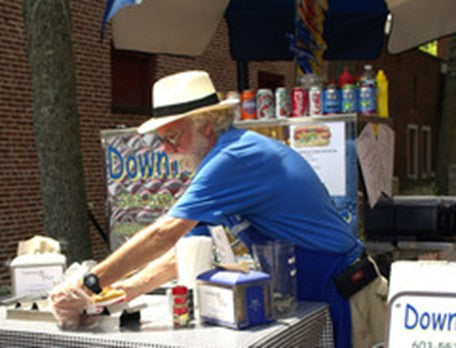
Along the way though, customers began asking for more. The specialty dogs were great, but people wanted Bill and Trina to start packaging and selling their gourmet condiments separately so they could be enjoyed at home and with other meals.
“People are fanatics about this stuff, it’s unbelievable,” Trina says.
What started with a couple of relishes, a handful of mustards, and a ketchup Trina sampled in England and altered with her unique touch, ultimately morphed into a line of gourmet condiments that now includes:
- Three Pepper Ketchup
- Whole Seed Mustard
- Bourbon & Berry Cranberry Sauce
- Sweet Allium Onion Relish
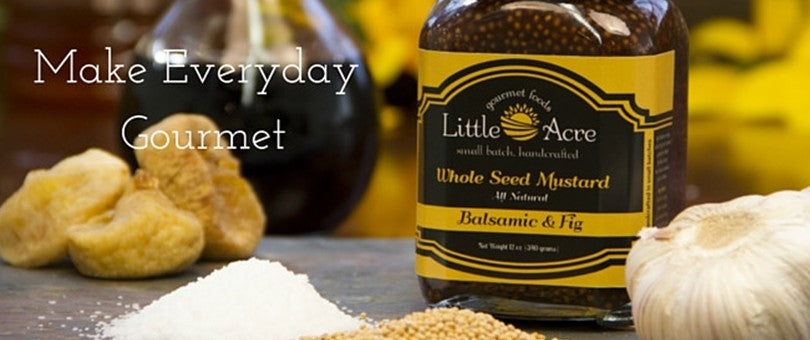
Despite the initial difficulty in jarring the condiments, the Weeny Wars not only yielded a collection of popular designer hot dogs that were selling fast, but also proof of concept for a budding gourmet condiment business.
Oh, it was amusing at first,” Trina says with a chuckle. “I’m always up for a challenge, but before I knew it, this condiment thing had gotten bigger than we had ever imagined.
The demand for condiments turned out to be a blessing.
Unbeknownst to the Ahrens, Downtown Dogs was about to die.
The Condiment Hustle
Trina and Bill, age 65 and 68 respectively, were, in essence, running two businesses at once; a hot dog stand and a packaged food business. “We’re getting older and hauling the hot dog cart to the street every day was getting to be too much,” Trina recalls. “We had to pick because we couldn’t do both businesses at the same time.”
But fate intervened and made the choice for them…
"I had an operation last September,” Bill volunteers. “So we shut down Downtown Dogs to concentrate on the condiment business."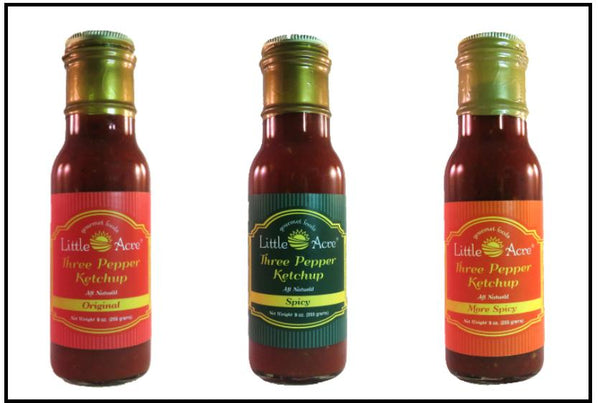
Despite putting the brakes on their hot dog business, the Ahrens didn’t take their foot off the entrepreneurial gas and relax. Instead, they kicked their effort into high gear and began moving at a pace entrepreneurs half their age may not be willing or able to keep.
"I really miss the hot dogs,” Bill says. “But focusing on the condiments was so much easier to do during my recovery."
By easy, Bill means:
- Co-packing, labeling, and loading cases of condiments into a vehicle;
- Driving hundreds of miles across three states every weekend to hold condiment tasting events; and
- Marketing the gourmet line to popular retailers and distributors.
If we can get people to taste it, we know they’ll buy it,” Trina says confidently. “That’s why we’re willing to drive for hours to hold these tasting events.
It’s this brand of “make it happen” grit and determination that today’s digital-only entrepreneurs can’t replicate while sitting in front of a computer screen. It’s also why the Ahrens’ gourmet condiments are now selling in four Whole Foods stores.
Little Acre Gourmet Foods, as the company is known, is now targeting the Boston area and hopes one day soon to be in upscale farm stands, rustic stores, and high end groceries.
“We’re crazy, I know,” Trina says of the miles the couple drives every weekend. “It’s absurd and I know it may sound stupid but it’s a good product and we think we can make it work.”
To make it work the Ahrens are trying something most retirees wouldn’t dare…
If it works, they might be able to outsource their tasting events and never have to drive another mile again.
Condiments in the Digital Age
“I’m really looking forward to growing the business in new ways,” Trina says. “It’d be so much easier to just ship packages rather than driving all the miles we do.”
It’s why the Ahrens, who are nearing their seventies, partnered with Shopify to establish an online distribution channel that could eliminate some of the heavy lifting that comes with driving to tasting events every weekend. The Ahrens might be beginning their ecommerce careers decades after many do, but they’re committed to learning quickly.
“I wish we had started this a long time ago,” Trina says. “I’m learning social media as we speak and have learned so much in the last two years — it’s just amazing.”
Just because online shoppers can’t taste Little Acre’s gourmet condiments doesn’t mean they aren’t willing to give them a shot. While the company may not yet have a robust ecommerce business, it has tasted what’s possible.
For instance, Little Acre saw a small spike in online sales of its gourmet gift boxes after promoting them on the New Hampshire Made website.
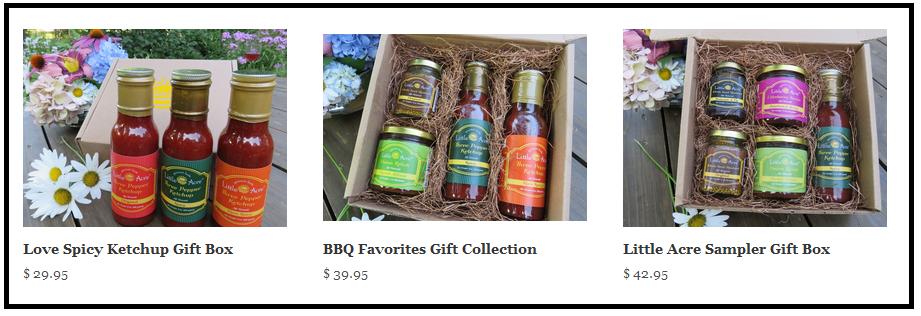
Our first big change was switching to Shopify,” Trina says. “We have a much better shopping cart now and a better site that allows people to research our products and get to know us a bit better.
The switch to Shopify, along with the help of a network of repeat customers who have fallen in love with the Ahrens just as much as the couple’s products, are helping Little Acre fine tune its online presence and boost the brand with:
The Ahrens have even set an ambitious goal; one day they hope to make half of all gourmet condiment sales online.
“We’re just starting to figure out ecommerce, and we know it’ll take some time because building a brand doesn’t happen overnight,” Trina says. “Shopify is great because it has so many features we can use like pop-ups that allow us to engage with customers we might otherwise never meet at a tasting event.”
Beyond the Farmer’s Markets
“ You’ve got to look beyond the farmers’ markets if you want to make it,” Trina says of ramping Little Acre’s online presence.
You’ve got to look beyond the farmers’ markets if you want to make it,” Trina says of ramping Little Acre’s online presence.
Besides preparing to unveil shiny new product labeling designed to bolster the aesthetics of their Shopify site, the Ahrens are planning to expand regionally with Whole Foods.
Ultimately, the couple hopes to get the attention of Seacrest Foods, a gourmet food distributor with whom Trina says many specialty food retailers prefer to do business.
“They have a huge presence,” Trina says admiringly. “Specialty food store managers love our condiments, but they’d rather buy from Seacrest rather than deal with a bunch of individuals like us.”
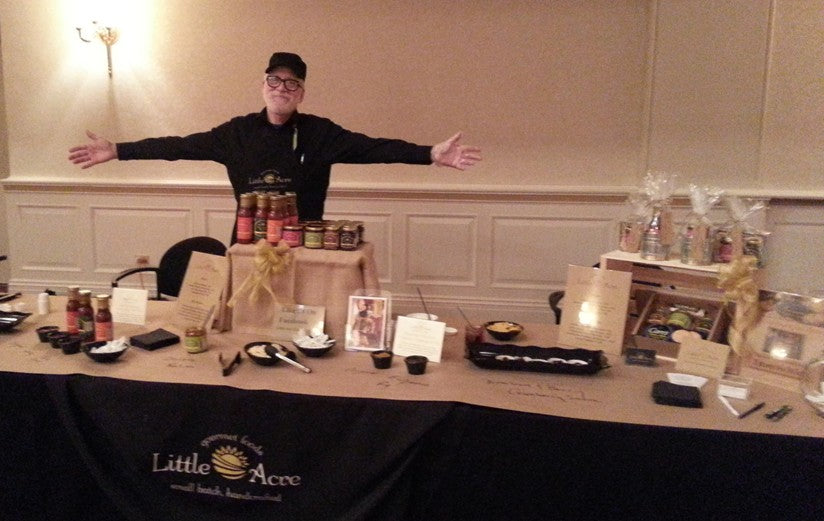
Until then, expect the Ahrens to ramp their online presence quicker than entrepreneurs who are years younger.
Because we’re old, we have to figure out a way to make the business work that doesn’t involve all of the heavy lifting and hundreds of miles we drive,” Trina says. “And because we’re old, we have to do it fast.
Maybe, but the gourmet effort with which the Ahrens are approaching entrepreneurship and ecommerce belies their age.
They’ve hustled their way this far.
Bet against them at your own risk.
“It has been an incredible little journey,” Trina says with a gentle smile. “If it continues, great. If not, we’ve loved it.”

About The Author
Nick Winkler is a contributor to the Shopify blog. He helps individuals and organizations generate new leads, make more money, and ignite growth with story. Get more from Nick here.
Read more
- How LisolaStore Grew Orders 20% by Unifying Sales Channels with Shopify
- MAAP Rides to Customer Success with Shopify POS
- How These Four Founders Built a Premium Bedding Brand From Scratch
- Assembly New York Maintains the Business of Hype with One Back Office
- How a 107-Year-Old Sneaker Company Reinvented Its Business With Omni-Channel Retail
- How a San Francisco Indie Wine Store is Attracting International Customers
- How Florentine Kitchen Knives Sped Up Store Checkout by 50% with Shopify
- How Oliviers & Co. Grew Revenue 350% by Unifying Online and In-Person Selling
- How This Lingerie Brand Hustled to Become a B2B Force in the Athleisure Industry





